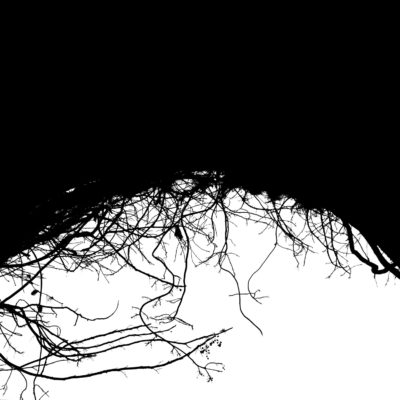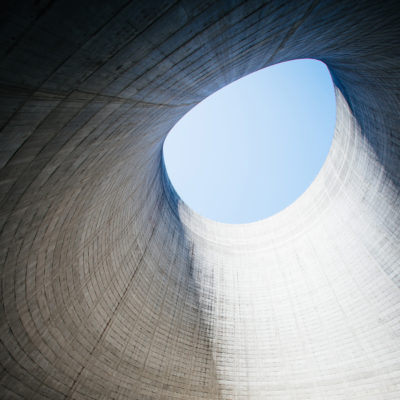Loss Less is an album consisting of two longform sound compositions (one original, one rework) comprised of acoustic recordings taken from inside Satsop—an abandoned American nuclear reactor turned artistic space.
It begins with a pattern of spacious singular tones of a melody, ringing out with desolate echoes and long tunnel-like reverberations, while a deep low cavernous rumble emerges slowly out of the mix and paints the backdrop of this eerie barren environment. This is soon accompanied by wind-like whooshes of atonal noise and distorted feedback.
As the piece progresses, you will realize that this melody repeats itself throughout the entire composition, but it’s obvious that it’s not just some looped sample—this is performed organically. You can hear slight variations in the melody, as it’s being played at different speeds with the overall intensity ebbing and flowing. The more the piece continues, the less clarity there is in the musicality. It gets murkier and murkier… it almost feels like you’re sinking deeper and deeper into the dark recesses of this large ominous, hollowed-out, artificial structure.
The lonely sounds resonate and ricochet off the walls and surfaces, eventually disappearing into the air, while if you listen closely—you will hear various environmental sounds occurring, such as the twittering of passing birds, and raindrops falling through the upper hole of the nuclear cooling tower.
Loss Less is a tense and ethereal sonic exploration of unique industrial architecture, and the natural elements that surround it. I don’t really understand all the technicalities of how this album was created, but what I do know is that Sadeghi’s sound design and the acoustic ecology of this piece is phenomenal, and makes for a such a wonderfully haunting and atmospheric listening experience.
—audiocrackle.blogspot.com
As artist-in-residence at Satsop in 2008, Sadeghi created a pre-recording – a string of metallic-sounding strikes, varying in attack and pitch, a little over two minutes long – then played it into the space of the unused cooling tower and recorded it, capturing the tower’s unique acoustic response to the recording. (The cover art above is a shot taken from inside the tower.) He then repeated the process with that new recording, capturing the next generation of sound. And so on, and so on, up to ten times through, recording and replaying every amplification and every distortion. What might sound objectively like a dead-end exercise in methodology resulted in something extraordinary.
Unlike Alvin Lucier’s legendary “I am sitting in a room” – a stated point of reference for “Loss Less” – things go askew quickly. By the third time through the cycle, the individual strikes of Sadeghi’s original recording sound as if they’re smothered in clouds of cotton wool. The dormant acoustics of the tower space are fully activated, pulsing and swelling and resonating, yet the source material can still be discerned through the sonic fog. By the fourth round, distortion has firmly taken over, and as you enter the fifth iteration, you’re in another realm altogether. Where Lucier’s piece gradually works its way toward a glowing sort of hum, “Loss Less” hungrily morphs into a howling delirium, a blistering, roaring blast that raised the hairs on my neck and left me flinching with delight. If you’re a fan of Yellow Swans’ mighty Going Places, you need to check this out.
In the spirit of reiteration, Sadeghi follows up the 25-minute “Loss Less” with a 25-minute rework, combining samples from his source material with various effects over a rumbling drum track that put me in mind of the calming, repetitive sounds of a train. Both pieces effectively conjure sounds of industries – one from what was intended to be the future, the other from the past. Sadeghi deftly slips into that temporal gap, exploring and exploiting the tension between presence and absence, representation and abstraction, site and non-site while drawing out the tower’s unintended yet serendipitous acoustic properties to create something altogether other. “Loss Less” offers caustic bliss in abundance. Be sure to play it loud.
—anothergreenkitchen.com


